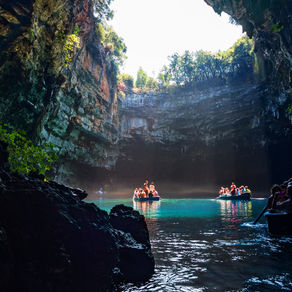Santorini Wine | The Ancient Juice, the Volcanic Soil and the Koulara Technique
- Shiny Greece
- May 15, 2021
- 3 min read
Updated: Mar 23, 2025
Author
George - The Shiny Greece Team (feat. ai)
Apart from one of the top islands of Greece and the world, Santorini is also the name of one of the most important wine regions of Greece with an area of 1.200 hectares. Wine making in Santorini comes from the ancient times, as Greece’s wine-making dates, in some areas, way back even to 3000 BC.

Santorini Wine | Photo by: iStock.com, PanosKarapanagiotis
In the course of history, the wine of Santorini was highly influenced by the Venetians during their Rule, this is why the most famous wine in Santorini is called Vinsanto or Visanto, a name close to Vin Santo of Venice, and it is made from grapes dried in the sun. However, there are several analysts who say that the name Vinsanto comes from Vin (=Wine) and Santo (=Santorini).
Santorini Wine Adventure
Wine from Santorini dates back to the eruption of its volcano around 1653 BC, although excavations in ancient Akrotiri have revealed much older strong indications of winemaking. When life came back to normal after the eruption, vine growing started from zero. In the Middle Ages, the island began to establish its identity and practices, with the help of the Venetians during their Rule. With the extended network of Venice and with the wine’s unique ability to withstand long sea voyages, Santorini wine was traded all over the Mediterranean and Europe. Even Ottomans, whose religion does not allow alcohol, did not stop wine trade after conquering the island in 1579, understanding the difficulty to cultivate other products in Santorini soil. In the early 19th century, best wines in Santorini were: the sweet and dry Vino Santo, the red Santorin and the white Nykteri. In the late 19th century, Santorini was one of few areas that were not affected by the Phylloxera pandemic, thanks to its unique volcanic soil which does not contain any of the clay that allows the survival of the parasite. This is the reason why many of the roots found on Santorini vineyards are centuries old!
Grape Varieties and Classified Wines
Santorini is famous for the indigenous white grape varieties Assyrtiko (the island’s flagship variety), Athiri and Aidani, which all produce mainly crisp, dry white wines, but also other great blended and rosè wines, when mixed with red grapes (Mandilaria and Mavrotragano which produce red wines). However, the most famous wine of the island, made from the Assyrtiko variety dried under the sun after harvest, is the sweet Visanto or Vinsanto.
The classified Santorini wines Greece today are Vinsanto, Santorini and Nykteri.

Wine from Santorini | Photo by: Marcelo Costa, Santorini wines, CC BY 2.0
The Vinsanto wine with the golden orange color comes from an ancient wine making tradition. To be labeled Vinsanto, a wine must be made of Assyrtiko grapes by at least 51%, with the remaining percentage including Athiri and Aidani, and a small part of other local varieties. Late harvested grapes are being dried in the sun for 12-14 days and, after fermentation, they are being aged for at least 2 years in oak barrels. It is classified as a dessert wine, but it can be paired with several dishes.
The Santorini wine is made of Assyrtiko grapes by at least 75%, with the remaining percentage including Athiri and/or Aidani. Most wineries choose not to age Santorini wine in oak barrels.
The Nykteri wine is made of grapes harvested at night and pressed during the next day. It is made of Assyrtiko grapes by at least 75%, with the remaining percentage including Athiri and Aidani. After fermentation, the wine is being aged for at least 3 months in oak barrels.
Cultivation Technique
The cultivation technique used by grape growers in Santorini is called “koulara”.

Santorini Wine Grapes Drying Under the Sun | Photo by: seligmanwaite, Akrotiri Grapes on Rooftop- Santorini, CC BY 2.0
What they do is this: when the vine grows on the ground, they turn it into baskets (like bird nests), so that external leaves and the vine itself protect the grapes from strong Aegean winds and from intense sunlight.
Santorini Wine Tour
Choose below one of the best wine tours of Santorini:
































































Santorini's volcanic soil and indigenous Assyrtiko grape produce distinctive, crisp white wines and the renowned sweet Vinsanto!
The wine stands out for its distinct taste, owed largely to the Santorini's volcanic soil and unique grape varieties like Assyrtiko. The volcanic terroir infuses the wine with minerality and complexity, while the sea breeze influences its character. Its crisp acidity and citrusy notes make it refreshing and versatile, pairing perfectly with seafood and Mediterranean cuisine. Tasting Santorini wine offers a sensory journey through the island's rich history and terroir, encapsulating the essence of its landscape!!! Its uniqueness lies not just in flavor, but in the experience it offers!!! 🇬🇷 🍷 🥂